
CRITICAL REVIEWS IN CLINICAL LABORATORY SCIENCES
Scope & Guideline
Illuminating Pathways in Clinical Laboratory Innovation
Introduction
Aims and Scopes
- Laboratory Diagnostics and Biomarkers:
Focus on the identification, validation, and clinical utility of biomarkers for various diseases, exploring their roles in diagnosis, prognosis, and treatment monitoring. - Innovative Technologies in Laboratory Medicine:
Emphasis on the latest advancements in laboratory technologies, including molecular diagnostics, omics approaches, and point-of-care testing, to improve diagnostic accuracy and efficiency. - Quality Assurance and Improvement in Laboratory Practices:
Discussion on methodologies for enhancing the quality and reliability of laboratory testing, including guidelines, standards, and best practices for laboratory operations. - Pharmacogenomics and Precision Medicine:
Investigates the implications of genetic variations on drug responses, aiming to tailor medical treatments to individual patients, thereby optimizing therapeutic outcomes. - Interdisciplinary Approaches in Clinical Laboratory Science:
Encourages collaboration across various scientific disciplines to address complex clinical challenges, integrating insights from genomics, proteomics, and bioinformatics.
Trending and Emerging
- Volatilomics and Breath Analysis:
The rise of research on volatilomic assays indicates a growing interest in non-invasive diagnostic methods, utilizing breath analysis to detect diseases, which could revolutionize clinical diagnostics. - Machine Learning and Artificial Intelligence in Diagnostics:
An increasing number of papers focus on the applications of machine learning and AI technologies to enhance diagnostic processes and data analysis, representing a significant trend towards digital transformation in laboratory medicine. - Liquid Biopsy Technologies:
Emerging research on liquid biopsies, particularly for cancer detection and monitoring, signifies a shift towards minimally invasive testing methods that provide real-time insights into disease progression. - Interdisciplinary Biomarker Research:
There is a notable trend in the exploration of biomarkers across multiple disciplines, integrating findings from genomics, proteomics, and metabolomics to enhance diagnostic and therapeutic strategies. - Pharmacogenomic Applications in Precision Medicine:
The increasing emphasis on pharmacogenomics reflects a growing trend towards personalized medicine, where genetic information guides treatment decisions to improve patient outcomes.
Declining or Waning
- Traditional Laboratory Techniques:
There is a noticeable decline in the publication of reviews focused on conventional laboratory techniques, as the field shifts towards more advanced and automated methodologies. - General Clinical Guidelines Without Specific Context:
Papers providing broad clinical guidelines without contextual application or specific case studies have decreased, reflecting a trend towards more nuanced and tailored recommendations. - Basic Biochemical Analysis:
The focus on fundamental biochemical tests has waned, with a growing emphasis on complex multi-parameter analyses and integrative approaches to diagnostics. - General Overviews of Common Diseases:
Publications that offer general overviews of common diseases without a focus on innovative diagnostic methods or specific biomarkers are becoming less prevalent. - Historical Perspectives on Laboratory Medicine:
There has been a reduction in articles that solely focus on the historical development of laboratory medicine, as the journal prioritizes current and future trends in the field.
Similar Journals

Journal of Clinical and Diagnostic Research
Advancing Clinical Insights Through Rigorous ResearchWelcome to the Journal of Clinical and Diagnostic Research, a leading open-access journal published by the PREMCHAND SHANTIDEVI RESEARCH FOUNDATION since 2007. This journal serves as a crucial platform for researchers and professionals in the fields of biochemistry, genetics, and molecular biology, with a particular focus on clinical biochemistry. The journal is recognized for its commitment to disseminating high-quality research, fostering academic dialogue, and enabling practitioners to stay at the forefront of advancements in diagnostic methods. With an ISSN of 2249-782X, the journal enhances accessibility to critical research findings and discussions, ensuring that the scientific community and interested students can engage with valuable insights. Although coverage has been discontinued in Scopus since 2018, its rankings within the clinical biochemistry domain reflect a dedicated scholarly impact that continues to influence research trajectories. We invite you to explore the wealth of knowledge presented in the Journal of Clinical and Diagnostic Research and contribute to the evolving discourse in clinical science.
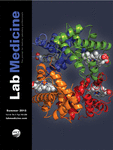
LABORATORY MEDICINE
Fostering excellence in laboratory diagnostics and research.LABORATORY MEDICINE, published by Oxford University Press, is a pivotal journal in the fields of biochemistry and clinical biochemistry, officially indexed under ISSN 0007-5027 and E-ISSN 1943-7730. Since its inception in 1973, it has provided a vital platform for the dissemination of high-quality research, facilitating scholarly communication and innovation in laboratory diagnostics and biochemistry practices. The journal is classified in the Q3 quartile for medical biochemistry and Q4 for clinical biochemistry, reflecting its commitment to enhancing the scientific community's understanding of laboratory science. With its quarterly publications and rigorous peer-review process, LABORATORY MEDICINE serves as an essential resource for researchers, professionals, and students alike, offering insights into the latest developments and methodologies in the field. As a part of a rapidly evolving discipline, the journal is not only dedicated to publishing original research but also aims to present reviews, case studies, and expert opinions that contribute to the advancement of laboratory medicine. In a global context, it emerges as a significant player, prioritizing accessibility, though currently maintaining a subscription-based model, facilitating informed research and clinical application.
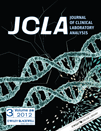
JOURNAL OF CLINICAL LABORATORY ANALYSIS
Connecting global researchers in laboratory medicine.JOURNAL OF CLINICAL LABORATORY ANALYSIS is a premier, peer-reviewed journal published by WILEY, focusing on the expansive field of laboratory medicine. With its ISSN 0887-8013 and E-ISSN 1098-2825, this open access journal has been serving the scientific community since 1987. As of 2023, it holds a notable impact in various domains, achieving category quartiles in Biochemistry, Clinical Biochemistry, Hematology, and more, showcasing its significance across multiple disciplines such as Medical Laboratory Technology and Public Health. Ranked impressively, it is placed 7th in Medical Laboratory Technology, reflecting its crucial role in advancing clinical practice and research. The journal aims to disseminate innovative research findings, methodologies, and reviews that can catalyze advancements in laboratory practices and improve patient outcomes. Accessible to a global audience since its transition to open access in 2019, the journal is not just limited to professionals but is also a valuable resource for students and researchers seeking to stay updated in this dynamic field. For more information, visit the journal's website.
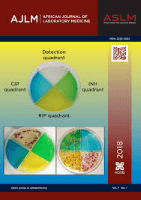
African Journal of Laboratory Medicine
Innovating clinical practices across the continent.The African Journal of Laboratory Medicine, ISSN 2225-2002, e-ISSN 2225-2010, is a premier publication dedicated to advancing the field of laboratory medicine within the African context. Published by AOSIS since 2012, this Open Access journal aims to disseminate influential research findings, clinical studies, and innovative techniques in the realms of Clinical Biochemistry, Medical Laboratory Technology, and Public Health. Based in South Africa, the journal not only serves as a critical platform for sharing knowledge and best practices but also plays a significant role in fostering public health discussions relevant to the continent. Over the years, it has established itself with impactful rankings in various categories, including a Q4 in Clinical Biochemistry and Q3 in both Medical Laboratory Technology and Public Health. As such, it caters to a diverse audience of researchers, professionals, and students eager to stay at the forefront of laboratory medicine research and its applications. The journal’s commitment to quality and accessibility positions it as an essential resource for those looking to make a significant impact in their respective fields.
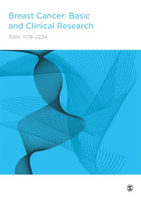
Breast Cancer-Basic and Clinical Research
Empowering discoveries in breast cancer care.Breast Cancer-Basic and Clinical Research is a premier open access journal published by SAGE Publications Ltd, dedicated to advancing the understanding and treatment of breast cancer through a comprehensive approach that integrates basic and clinical research findings. Since its inception in 2008, this journal has aimed to serve as a vital platform for researchers, healthcare professionals, and students in the fields of oncology and cancer research, providing them with timely access to significant new research, clinical trials, and innovative methodologies. With its current rankings placing it in the Q3 quartile for Cancer Research and Oncology, it reflects a steady commitment to quality and relevance, ranking #167/404 in Medicine - Oncology and #133/230 in Biochemistry, Genetics and Molecular Biology - Cancer Research as of 2023. The journal is designed to foster dialogue and collaboration across disciplines, enabling advancements in therapeutic strategies and patient care. Researchers and professionals will find it an invaluable resource as it continues to push the frontiers of knowledge in breast cancer research.
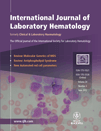
International Journal of Laboratory Hematology
Pioneering insights in hematology for a healthier tomorrow.The International Journal of Laboratory Hematology, published by WILEY, serves as a vital resource in the field of hematology, delivering high-quality research findings and innovations within laboratory practices since its inception in 2007. This journal, accessible under Open Access options, showcases cutting-edge studies that span critical aspects of biochemistry and clinical laboratory methodologies. With a notable impact factor reflected in its Q2 and Q3 rankings across various categories—such as Biochemistry (medical) and Hematology—this journal stands out within the Scopus rankings, positioning itself within the 60th and 59th percentiles of its respective fields. Situated in the United Kingdom, the journal's objectives lie in disseminating pivotal research that enhances our understanding of hematological disorders and laboratory techniques, making it an essential tool for researchers, professionals, and students alike who are committed to advancing the science of laboratory hematology and its applications.

AMERICAN JOURNAL OF CLINICAL PATHOLOGY
Catalyzing Innovations in Pathology and Forensic MedicineThe American Journal of Clinical Pathology, published by Oxford University Press Inc, stands as a vital resource in the fields of pathology and clinical medicine. With a rich history dating back to 1945 and an impressive impact factor reflected in its Q1 ranking in Pathology and Forensic Medicine, this journal serves as a cornerstone for researchers and professionals seeking to advance their knowledge and practice. Covering a breadth of topics within the discipline, it is recognized in 2023 as ranked #24 out of 208 in its category, highlighting its esteemed reputation within the scientific community. Although the journal does not currently offer open access, its rigorous peer-reviewed articles and cutting-edge research make it an essential addition to any academic or clinical library. The ISSN for print version is 0002-9173, with an E-ISSN of 1943-7722 available for digital access. Researchers, students, and practitioners alike will benefit from its comprehensive scope and commitment to disseminating high-quality scientific inquiry.

Annals of Clinical and Analytical Medicine
Exploring the frontiers of clinical and analytical medicine.Annals of Clinical and Analytical Medicine, published by BAYRAKOL MEDICAL PUBLISHER, is a premier open-access journal dedicated to advancing the field of clinical and analytical medicine. With the evolving landscape of healthcare, this journal serves as a crucial platform for the publication of high-quality research that encompasses a wide range of topics in medical science, offering insights into innovative clinical practices and analytical methodologies. The journal, identifiable by its E-ISSN 2667-663X, promotes the dissemination of knowledge by providing unrestricted access to its articles, thus ensuring that researchers, healthcare professionals, and students can stay abreast of the latest findings and developments. As it continues to gain recognition, Annals of Clinical and Analytical Medicine aims to foster an inclusive dialogue within the global medical community, encouraging collaboration and promoting high-impact research that addresses pressing healthcare challenges.

Clinical Pathology
Connecting Researchers to the Future of Pathological ScienceClinical Pathology, an esteemed journal published by SAGE Publications Ltd, stands at the forefront of advancing knowledge in the intersection of histology, microbiology, and pathology. As an Open Access journal since 2019, it provides researchers and healthcare professionals seamless access to high-quality, peer-reviewed articles that contribute to the field's growing body of knowledge. With a focus on enhancing diagnostic methodologies and advancing clinical applications, Clinical Pathology serves a diverse audience eager to explore innovative research and practical insights. The journal currently holds Q3 status in Histology and Pathology and Forensic Medicine, and Q4 in Medical Microbiology, reflecting its commitment to rigorous scholarship within a competitive landscape. Its ranking in Scopus further positions it as a vital resource for professionals striving for excellence in clinical and experimental pathology. We invite researchers, students, and professionals to engage with the latest findings and share their valuable contributions to help propel the field forward.
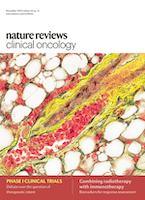
Nature Reviews Clinical Oncology
Unlocking Innovations in Oncology ResearchNature Reviews Clinical Oncology is a premier journal dedicated to the comprehensive exploration and critical evaluation of current advancements in the field of clinical oncology. Published by the esteemed NATURE PORTFOLIO in the United Kingdom, this influential journal boasts an impressive impact factor that reflects its significant role in shaping oncology research. As a Q1 ranked journal in Scopus, it occupies a notable position within the top tier of oncology publications, placing it in the 99th percentile among its peers. With a history of convergence from 2009 to 2024, it presents high-quality content through an open-access model, ensuring accessibility to vital research findings. Researchers, professionals, and students alike will find Nature Reviews Clinical Oncology an invaluable resource for staying abreast of the latest trends, biologic insights, and therapeutic innovations that drive the future of cancer treatment.